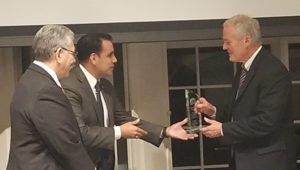Church leaders and evangelical university administrators at the National Hispanic Education Summit celebrated accomplishments and shared ideas they hope to see achieved in the future.
Dallas Baptist University hosted the Faith Education Coalition-sponsored event.
Related problems explored
Major issues discussed at the summit included retention of Hispanic college students. Although many more Hispanic students are pursuing higher education than in the past, only 22 percent of them complete college and earn a degree.
Leaders and administrators also expressed concern about the lack of Hispanic presence and representation at Christian evangelical universities across the country.
During the summit, Benjamin Espinoza, a doctoral candidate at Michigan State University, suggested those two issues may go hand-in-hand.
While Hispanic students pursuing college education significantly increased in the past two decades, the presence of Hispanics serving as university leaders or presidents remains stagnant, Espinoza said.
Only about 4 percent of all university presidents in the country are Hispanic, Espinoza noted. Two of those—Carlos Campo of Ashland University and Abraham Jaquez of Baptist University of the Américas—attended the summit.
Because they do not see people like themselves in school leadership, Hispanic students feel a sense of foreignness and also feel unwelcomed, said Elizabeth Palacios, dean for student development at Baylor University.
When students first arrive at these universities they ask themselves, “Is this for me?” Palacios said.
Sign up for our weekly edition and get all our headlines in your inbox on Thursdays
“Intellectually, they are there, but little by little, they stop flourishing,” she noted.
Gus Reyes, director of the Texas Baptist Christian Life Commission, and Campo noticed those issues a decade ago and initiated efforts to promote Hispanic college completion.
Lingering problems from the past
Issues Hispanics face in colleges and universities often stem from social problems in the past, several summit speakers noted.
For example, Baylor University did not take its first steps to end racial segregation until 1964, when the school enrolled its first African-American student, Palacios noted.
Palacios and other speakers also noted how school staff in the high schools they attended thought college education would not fit them because of their ethnicity.
Tina Villarreal, vice president of student experience at Stark College and Seminary, also noted the segregation Hispanics faced at Texas public schools.
Even though many of the students in public grade school during the early 1900s until the 1960s were American citizens, they often were reprimanded and punished for speaking Spanish, Villarreal stated.
As a result, many Hispanics in that time felt disconnected from their ethnic identity and previous generations of their own families, Villarreal said.
Universities making necessary changes
While not every goal has been achieved, speakers at the summit expressed gratitude for what has been accomplished.

Because of the Hispanic growth in the country, universities realize they have a lot left to do, Palacios said. So, schools are beginning to recognize the changes required to serve Hispanic students better, she noted.
Scholarships for Hispanic students, focused on their particular needs, are increasing in more and more schools, school administrators reported.
In order to establish a better connection with students and their families, universities and colleges realize information must be presented both in English and Spanish, they noted.
Through school recruiters, universities also aim to provide information in the best way possible to family members who perhaps come from another country and who may have little formal advanced education.
The support schools offer to Hispanic students increases when they bring in staff and faculty who understand the historical and cultural contexts of Hispanic education in the country and who strengthen their relationship with students by understanding their needs, speakers noted.
Educators also encouraged churches to understand more about topics related to science, technology, engineering and math so they can encourage young Hispanics to expand their horizons and maintain their faith while they pursue education.
Churches can invest in Hispanic students

Girien Salazar, executive director of the Faith and Education Coalition, also highlighted efforts of congregations and ministries that invest in education for Hispanics. Salazar noted churches that set apart funds in their yearly budgets for scholarships, as well as ministries that help young Hispanic students visit universities and learn what they need to get in college.
Efforts for Hispanic college completion can start at the local church, Salazar said. As increasing numbers of Hispanics seek higher education, costs, distance from family, language and culture still present enormous challenges for them, he noted.
Salazar expressed his hope that the next 10 years, both universities and churches will offer better care to Hispanics seeking an academic degree, even though those students may not entirely fit the typical profile of a college student.
“I’ve seen and experienced the challenges we face,” Salazar said. “Our next 10 years, we must continue fighting for all of God’s children to pursue higher education.”














We seek to connect God’s story and God’s people around the world. To learn more about God’s story, click here.
Send comments and feedback to Eric Black, our editor. For comments to be published, please specify “letter to the editor.” Maximum length for publication is 300 words.